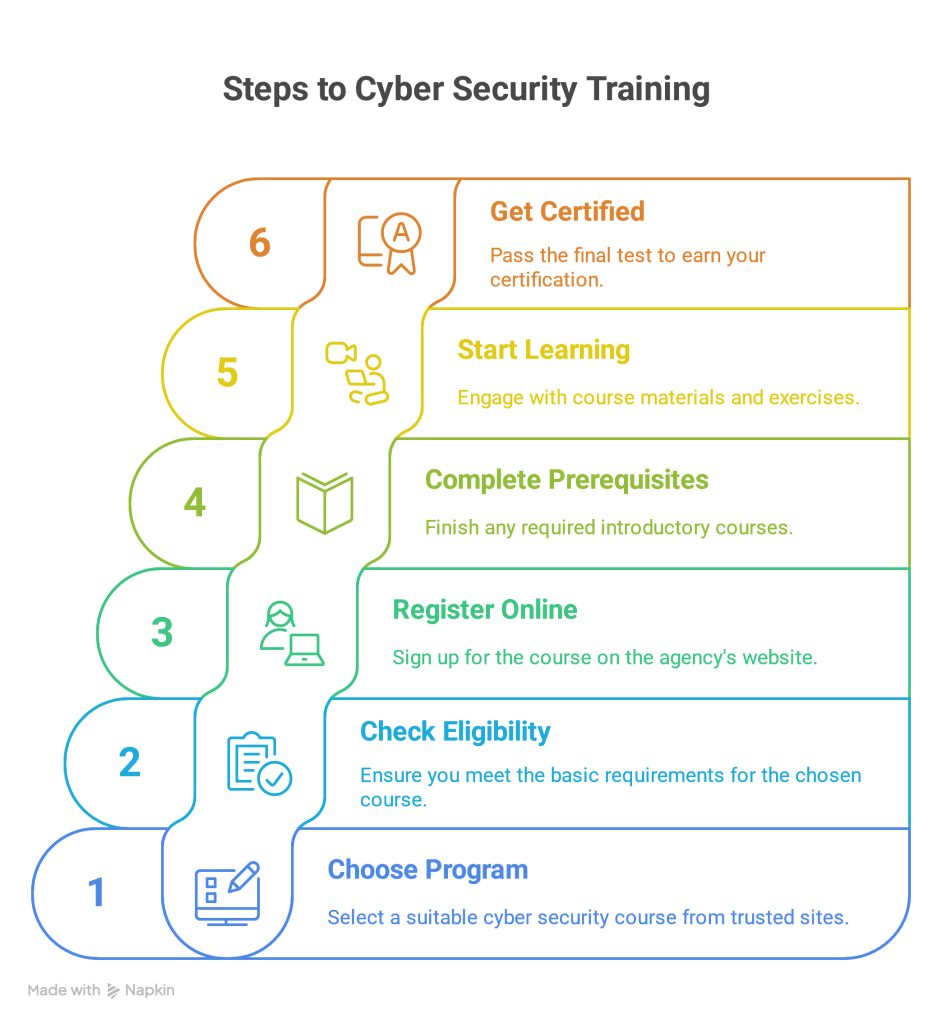You can access free government cyber security training by enrolling in trusted programs like DHS, CISA, FEMA, and NIST. These offer zero-cost courses and certifications to boost your skills, protect organizations, and open doors to cyber security careers — all without paying a dime.
Cyber threats are growing every day, and not everyone can afford expensive courses to keep up. If you’ve ever wondered how to learn cyber security for free, you’re not alone. The good news? Many government agencies provide high-quality training at no cost. In this guide, you’ll discover exactly where to find these free resources, how to sign up, and how to start building your cyber security skills today. Let’s break it down step by step.
Why Cyber Security Training Matters
Cyber attacks happen every day, targeting businesses, governments, and regular people. Hackers steal data, money, and even personal identities. This is why cyber security has become one of the most critical skills today. Knowing how to protect systems and stop attacks can save companies millions and keep personal information safe.
Cyber security professionals are in high demand worldwide. According to ISC², there is still a huge talent gap in the cyber security workforce. Companies need skilled workers who can detect threats, fix weaknesses, and protect data. By learning these skills, you can start a stable, well-paying career.
Free government cyber security training helps anyone gain these skills without spending money. It removes the financial barrier, so more people can join this fast-growing field.
What is Free Government Cyber Security Training?

Free government cyber security training is special training provided by government agencies to help people learn how to protect digital systems. Many government organizations offer free online courses, learning materials, and even certifications. These programs are trusted and created by experts in the field.
For example, the Department of Homeland Security (DHS) offers basic to advanced courses for individuals and companies. The Cybersecurity and Infrastructure Security Agency (CISA) provides free training tools and online exercises to practice real-world scenarios. Other agencies like FEMA and NIST also share guidelines and training for anyone interested in learning.
These programs help people gain knowledge and skills needed to protect networks, respond to threats, and follow safety standards. Most courses are self-paced, so you can learn when it fits your schedule.
Who Can Benefit From These Programs?
Free government cyber security training is open to everyone. You don’t need special experience to get started — just curiosity and a willingness to learn. Here are some groups that benefit the most:
Students and recent graduates: Free training helps students gain skills that employers want. It’s a great way to stand out in job applications.
IT professionals: Those already working in technology can use these programs to upgrade their skills and learn about the latest threats.
Businesses: Small businesses can train their staff to handle cyber threats, which helps protect customer data and avoid costly breaches.
Job seekers and career changers: Anyone wanting to switch careers or get back into the workforce can use this training to enter the growing cyber security field.
These programs are also useful for non-technical workers who want to understand basic security practices. Many courses cover topics like safe passwords, phishing scams, and safe browsing — essential knowledge for everyone.
If you belong to any of these groups, free government cyber security training can open new opportunities and help you stay protected online.
Popular Free Government Cyber Security Training Programs
Many government agencies offer trusted cyber security training that you can start today at no cost. These programs cover everything from basic safety to advanced skills for protecting data and systems. Below are some of the most popular options available for students, workers, and business owners.
DHS (Department of Homeland Security) Training
The Department of Homeland Security (DHS) provides a wide range of cyber security training resources. Their courses cover beginner to advanced topics and help you learn how to spot threats, secure devices, and handle incidents. DHS training is designed for individuals and for organizations that want to train their staff.
Some DHS courses even come with certificates of completion, which you can add to your resume or LinkedIn profile. Many companies trust DHS training because it follows national standards and best practices.
CISA Cyber Security Courses
The Cybersecurity and Infrastructure Security Agency (CISA) is another key resource. CISA offers free online training, webinars, and exercises that simulate real-life cyber attacks. This helps learners practice how to respond to threats in a safe environment.
CISA’s website has a Training Catalog with self-paced courses and workshops on topics like phishing, malware, and ransomware. Some courses include digital badges you can share with employers.
FEMA Cyber Security Courses
FEMA (Federal Emergency Management Agency) provides training focused on emergency management, including how to handle cyber incidents during disasters. FEMA’s free courses teach you how to prepare for, respond to, and recover from cyber threats that can affect communities.
FEMA training is helpful for local government workers, emergency responders, and anyone who wants to understand how cyber attacks can impact critical services.
NIST Cyber Security Resources
The National Institute of Standards and Technology (NIST) is well-known for setting cyber security guidelines used worldwide. NIST offers free guides, frameworks, and tutorials to help organizations and individuals follow the best security practices.
While NIST does not provide full courses like DHS or CISA, its resources are perfect for deepening your knowledge and making sure you follow industry standards.
Types of Courses and Certifications Offered
Free government cyber security training includes many different topics and levels. Some programs focus on awareness for beginners, while others offer advanced skills for those working in IT or security jobs.
Below is a quick overview of the common course types and certifications you can find:
| Course Type | Description | Examples |
|---|---|---|
| Basic Awareness Training | Teaches the basics of staying safe online and spotting threats. | DHS Security Awareness, CISA Phishing Training |
| Intermediate Technical Skills | Covers network security, malware defense, and safe configurations. | CISA Cyber Hygiene Services, DHS Cybersecurity Basics |
| Advanced Threat Analysis | Teaches how to detect and analyze cyber threats and attacks. | CISA Incident Response Exercises |
| Compliance and Policy | Explains laws and standards organizations must follow. | NIST Cybersecurity Framework Guides |
| Certification Exams | Some programs offer certificates to prove you finished the course. | DHS Certificates of Completion, CISA Badges |
Many courses are self-paced, so you can learn when you have time. Certificates and badges show employers that you have verified skills in cyber security.
How to Apply for Free Government Cyber Security Training

Applying for free government cyber security training is simple and can be done online in just a few steps. Here’s how to get started:
- Choose a Program: Visit trusted sites like DHS, CISA, FEMA, or NIST. Read about the courses they offer.
- Check Eligibility: Most courses are open to the public. Some advanced programs may ask for basic knowledge of computers or networks.
- Register Online: Follow the instructions on the agency’s website to sign up. Many programs ask you to create a free account.
- Complete Prerequisites: Some advanced courses may need you to finish an introductory course first. This makes sure you understand the basics.
- Start Learning: Most courses are self-paced. Watch videos, read materials, and take practice exercises.
- Get Certified: For courses with certificates or badges, complete the final test or project to earn proof of your skills.
Tip: Stay motivated by setting goals and a weekly schedule. Some courses have forums or support groups — join them to ask questions and learn with others. By taking these steps, you’ll gain valuable knowledge and be ready to protect networks or start a new career in cyber security.
Tips to Succeed in Online Government Cyber Security Training
Free government cyber security training gives you amazing resources, but success depends on how you use them. Follow these simple tips to make the most of each course and get real skills that help in jobs or daily life.
Create a study plan: Set aside time each week for training. Treat it like a class with regular study hours. Consistency helps you finish courses faster.
Use discussion groups: Many programs, like CISA, have online communities or forums. Joining these helps you ask questions and learn from others’ experiences.
Practice hands-on: Some courses come with labs or exercises that show you how to spot threats and fix issues. Use them often. You can also find free cyber security simulators to practice.
Take notes: Write down key ideas and steps. These notes help you review later and prepare for exams or job interviews.
Earn certificates: When you complete a course, download your certificate or badge. Share it on LinkedIn or your resume to show employers your new skills.
Frequently Asked Questions (FAQs)
Is free government cyber security training really free?
Yes! These programs are funded by government agencies like DHS and FEMA. They do not charge you for learning materials or tests. Some advanced certifications outside these programs might cost money, but the core training is free.
Are these certifications recognized by employers?
Most employers trust certificates and badges from government-backed programs. For example, a certificate from DHS or a badge from CISA shows you learned from trusted national security experts. Adding these to your resume can make you stand out.
How long does it take to complete the courses?
Course length varies. Some basic awareness courses take an hour or two. Advanced training can take a few days or weeks, depending on how much time you spend studying each week.
Can businesses enroll employees in these programs?
Yes! Many businesses use free government training to teach employees about safe online practices. This helps protect company data and reduce the risk of cyber attacks. CISA’s toolkit is a good starting point for companies.
What are the basic requirements to enroll?
Most programs require an internet connection and an email address to register. Some technical courses suggest basic computer knowledge. But don’t worry — there are many beginner courses that need no experience at all.
Conclusion
Cyber threats are not going away. Luckily, free government cyber security training makes it possible for anyone to learn how to stay safe online and build a career in this growing field. By using trusted resources from DHS, CISA, FEMA, and NIST, you can gain skills that protect you, your family, or your business. Take the first step today and explore these free courses. A safer digital future starts with you.